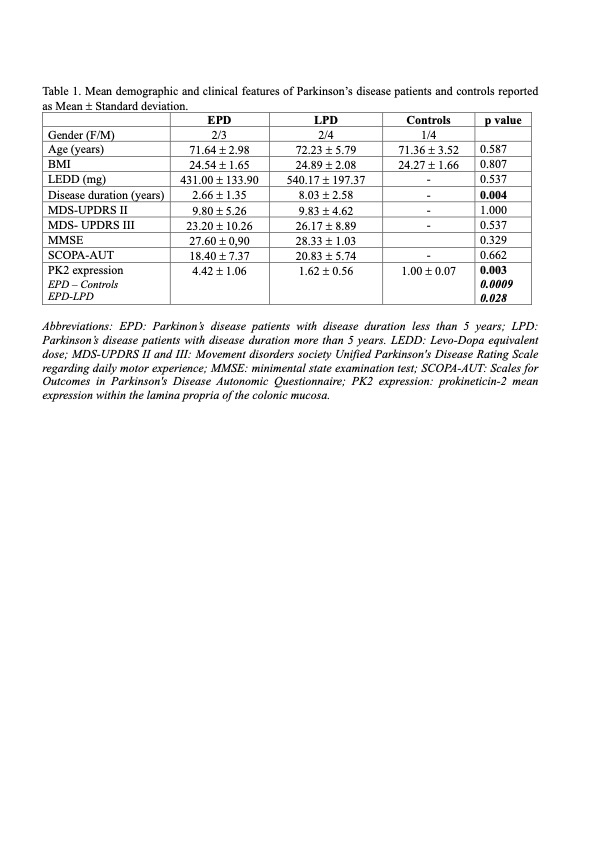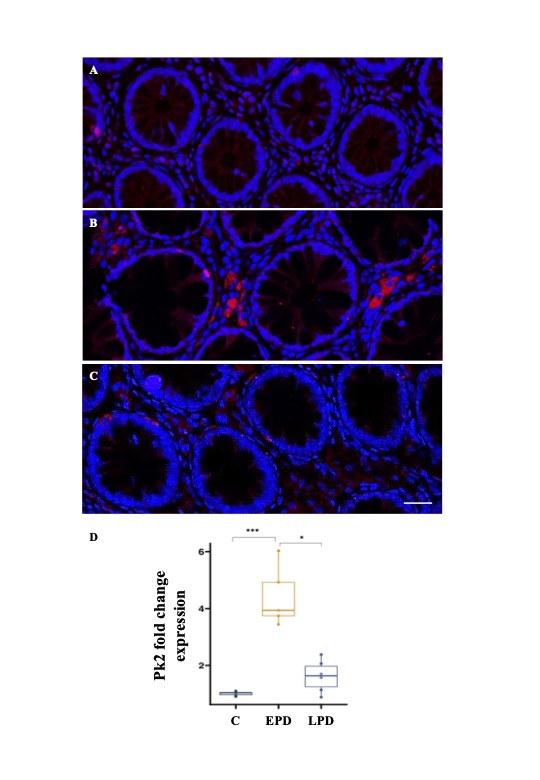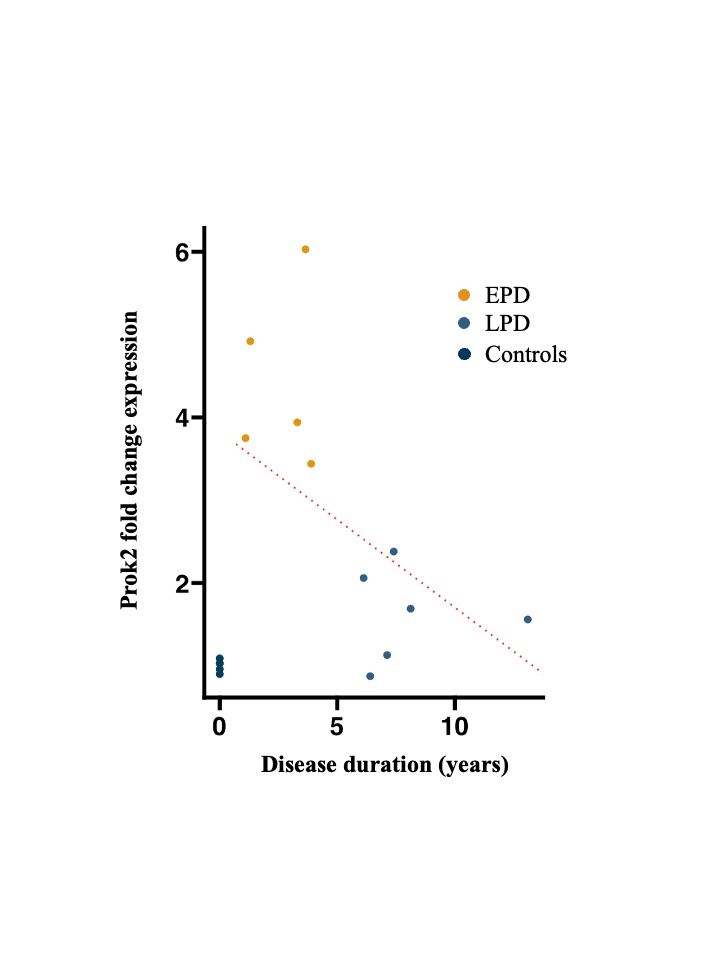Category: Parkinson's Disease: Pathophysiology
Objective: To investigate the expression of PK2 in colonic biopsies of PD patients.
Background: Neuroinflammation is emerging as a key factor involved in the pathophysiology of Parkinson’s disease (PD) that contributes to dopaminergic neurodegeneration [1]. In this context, several studies have shown that prokineticin-2 (PK2), a chemokine-like protein, can modulate immune/inflammatory responses and neuronal damage in PD [2–5].
Of interest, over the last year, several studies support the contention that gut alterations, such as dysbiosis, impairments of the intestinal barrier, colonic inflammation and enteric pathological α-synuclein accumulation, represent early events in PD that can contribute to central pathology via the gut-brain axis [6].
Method: The study included 11 patients with PD, five of them with a disease duration less than 5 years (EPD) and 6 patients with longer disease duration (LPD). As a control group, five asymptomatic subjects comparable by age and sex were enrolled. All participants underwent colonoscopy for screening of colorectal cancer and mucosal biopsies from the descending colon were obtained from PD patients (n=11) and healthy controls (n=5) during the endoscopic exam. Biopsy samples were processed for PK2 immunofluorescence.
Results: Demographic and clinical information of PD patients and control are reported in table 1. We revealed an increased PK2 expression in colonic mucosa from EPD patients compared to controls (4.42 ± 1.06 vs 1.00 ± 0.07, p = 0.0009) and it was inversely correlated with the disease duration (Fig.1-2).
Conclusion: PK2 is highly expressed within the colonic lamina propria of EPD patients, suggesting the potential role of PK2 in PD pathogenesis and gut inflammation.
Table 1
Figure 1
Figure 2
References: [1]. Muñoz-Delgado L, Labrador-Espinosa MÁ, Macías-García D, Jesús S, Benítez Zamora B, Fernández-Rodríguez P, et al. Peripheral Inflammation Is Associated with Dopaminergic Degeneration in Parkinson’s Disease. Mov Disord. 2023;38:755–63.
[2]. Lattanzi R, Severini C, Maftei D, Saso L, Badiani A. The Role of Prokineticin 2 in Oxidative Stress and in Neuropathological Processes. Front Pharmacol. 2021;12 March:1–8.
[3]. Lattanzi R, Maftei D, Petrella C, Pieri M, Sancesario G, Schirinzi T, et al. Involvement of the chemokine prokineticin-2 (PROK2) in alzheimer’s disease: From animal models to the human pathology. Cells. 2019;8.
[4]. Gordon R, Neal ML, Luo J, Langley MR, Harischandra DS, Panicker N, et al. Prokineticin-2 upregulation during neuronal injury mediates a compensatory protective response against dopaminergic neuronal degeneration. Nat Commun. 2016;7:1–18. doi:10.1038/ncomms12932.
[5]. Schirinzi T, Maftei D, Passali FM, Grillo P, Zenuni H, Mascioli D, et al. Olfactory Neuron Prokineticin-2 as a Potential Target in Parkinson’s Disease. Ann Neurol. 2023;93:196–204.
[6]. Klann EM, Dissanayake U, Gurrala A, Farrer M, Shukla AW, Ramirez-Zamora A, et al. The Gut–Brain Axis and Its Relation to Parkinson’s Disease: A Review. Front Aging Neurosci. 2022;13 January:1–17.
To cite this abstract in AMA style:
G. Bellini, G. Palermo, F. Rettura, E. Del Prete, E. Unti, C. Ippolito, C. Pellegrini, D. Frosini, N. Bernardini, R. Ceravolo. Prokineticin-2 is highly expressed in colonic mucosa of early Parkinson’s disease patients [abstract]. Mov Disord. 2024; 39 (suppl 1). https://www.mdsabstracts.org/abstract/prokineticin-2-is-highly-expressed-in-colonic-mucosa-of-early-parkinsons-disease-patients/. Accessed April 20, 2025.« Back to 2024 International Congress
MDS Abstracts - https://www.mdsabstracts.org/abstract/prokineticin-2-is-highly-expressed-in-colonic-mucosa-of-early-parkinsons-disease-patients/



